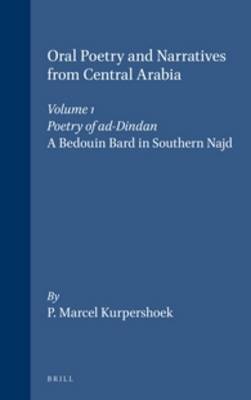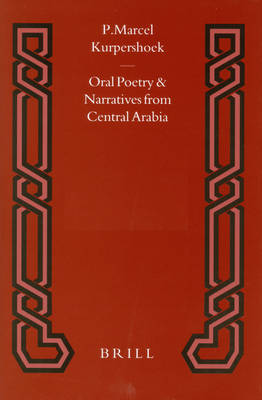Oral Poetry and Narratives from Central Arabia (5 vols)
2 total works
17/1
Oral Poetry and Narratives from Central Arabia, Volume 1 Poetry of ad-Dindan
by Marcel Kurpershoek
Published 1 February 1994
This work presents the complete collection of oral poetry by ad-Dindān, a bedouin poet of the Duwāsir tribe in southern Najd, transcribed and translated on the basis of taped recordings. The text is representative of a poetic tradition which has remained remarkably close to the desert poetry of the early classical age. An extensive glossary, including detailed cross-references to the classical Arabic vocabulary, completes this edition.
The introduction describes Dindān's somewhat anomalous position in local society as a result of his stubborn attachment to nomadism, his fierce artistic temper, and his unreconstructed bedouin ethos. It also discusses the composition of oral poetry, the dīwān's themes and its place in the Najdi tradition, the impact of literacy on the poet's oral work, and the prosodic and linguistic features of the text.
The introduction describes Dindān's somewhat anomalous position in local society as a result of his stubborn attachment to nomadism, his fierce artistic temper, and his unreconstructed bedouin ethos. It also discusses the composition of oral poetry, the dīwān's themes and its place in the Najdi tradition, the impact of literacy on the poet's oral work, and the prosodic and linguistic features of the text.
17/2
Oral Poetry and Narratives from Central Arabia, Volume 2 Story of a Desert Knight
by Marcel Kurpershoek
Published 1 March 1995
The Story of a Desert Knight is the second volume of a trilogy entitled Oral Poetry and Narratives from Central Arabia. It is devoted to the narratives told about and the poems composed by Šlēwīḥ al-‘Aṭāwi and his brother Bxīt, both famous desert knights in the middle and second half of the nineteenth century. The principal source of this book is Šlēwīḥ's great-grandson Xālid, a sheikh of the ‘Utaybah tribe.
The introduction discusses inter alia the general characteristics of Bedouin oral culture, the linguistic, prosodic and stylistic features of the text, and Xālid's use of his ancestors' oral legacy in order to enhance his position in the tribal hierarchy of prestige. In addition to the translation of the oral text this volume offers a complete transcription, based on taped records and including variants found in published Saudi sources, and a substantial glossary.
The introduction discusses inter alia the general characteristics of Bedouin oral culture, the linguistic, prosodic and stylistic features of the text, and Xālid's use of his ancestors' oral legacy in order to enhance his position in the tribal hierarchy of prestige. In addition to the translation of the oral text this volume offers a complete transcription, based on taped records and including variants found in published Saudi sources, and a substantial glossary.

